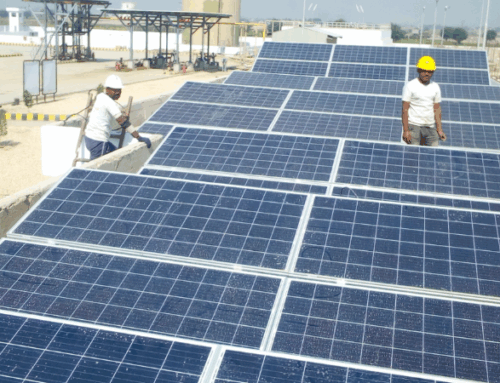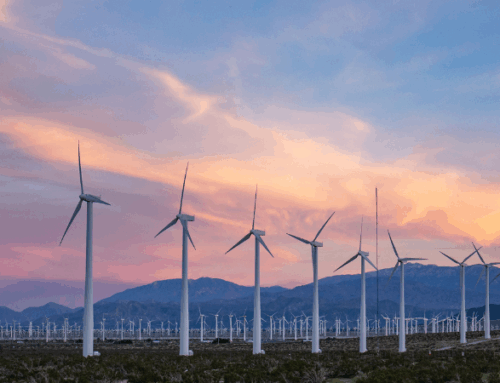At a Glance:
To establish yourself as a successful energy broker, one must be able to differentiate himself in the competitive retail energy markets. Click on any of the links below to skip ahead
Why It’s Important To Stay Competitive In The Energy Brokerage Business
The energy brokerage industry is flooded with competition. And, since many energy brokerage firms offer referral programs, you are not only competing with other licensed energy brokers, but also an array of referral partners. There are many reasons to remain focused on sharpening your skills.
Low Barrier Of Entry
As we stated before, the retail energy markets are competitive. In fact, over the last decade the amount of licensed energy brokers has almost quadrupled! Although many deregulated energy states require an energy broker license, the barrier of entry into the market is quite low. Anyone with a bit of business experience and small financial backing can become an energy broker. Because of this, more and more brokers are getting licensed each year and the competitive landscape becomes more challenging.
Energy Market Prices Are Volatile
Another reason to always be researching and learning about the energy market is due to the fact that energy commodities are constantly changing. Energy prices are affected by supply and demand, global economic conditions, and political circumstances. In order to be a resource for your customers and find the lowest-priced energy for them, you need to constantly be reading and learning about market trends.
The Regulatory Environment Is Changing
The retail energy market is highly regulated by utility commissions, FERC, and other local laws. And, these rules and regulations are not set in stone. In fact, energy industry regulations change quite frequently based on new technologies, consumer complaints, and changes in governing bodies. Recently, the New York Public Service Commission passed a bill tightening the requirements for energy suppliers and energy brokers in the state of New York.
Energy Scams Are On The Rise
Energy scams and energy fraud are more prevalent now than ever before. In fact, many retail energy companies are enrolling customer accounts without permission, charging egregious post-term rates, and even charging energy pass-through charges unbeknownst to the customer. This makes establishing trust with new prospects and winning new customers harder than ever.
How To Be A Better Energy Broker
In order to overcome all of these challenges, you must be willing, ready and able to take them head on. Luckily, our team of energy market experts put together a list of things to do in order to become a better energy broker.
1. Sharpen Your Sales Skills.
First things first, energy brokers must have superior sales skills in order to be successful. In fact, besides understanding the energy markets and being able to offer expert advice, sales is the number one skill you must possess.
Many think being a good salesperson is about persuading and convincing; however, in reality a good salesperson is great at identifying and solving problems for customers. Here are a few tips on sharpening your sales skills this year:
Think About The Interests Of Others
All great salespeople possess the skill of empathy. It is critical to be able to put yourself in your customer’s shoes in order to understand their perspective and needs. Many energy brokers make the mistake of thinking their energy products or solutions are enough to make a deal happen. On the contrary, each customer is unique and his or her needs must be understood and met in order to win their business.
Be A Good Listener
Great salespeople are great listeners. It is imperative to pay close attention to what your prospects are saying. Many times, they will tell you exactly what they are looking for and provide you with all the information you need to meet their needs and close the deal!
Track Your Activity
It’s amazing how busy we think we are! Many energy brokers and salespeople fall into the trap of confusing busy work with productivity. It is utterly important to track prospecting calls or meetings each day, the number of quotes, and signed deals. Without holding yourself accountable to the numbers, you will get lost in the busy work and get nothing done!
Frank Bettger, an insurance salesman who generated millions of dollars worth of income in the 1940’s, wrote a book titled How I Raised Myself From Failure To Success In Selling. This book is a wonderful resource for learning the fundamental skills of sales.
2. Get Good At Generating Customer Referrals.
The best way to get new business as an energy broker is through customer referrals. Cold prospecting is hard, and if you do it right, you can eventually wean yourself off of cold calling and simply work customer referrals.
In fact, once you begin to close new customer contracts, save customers money, and meet their needs, many will be happy to refer you to others. Here are a few tricks on generating more customer referrals as an energy broker:
Get The Referral By…
- Be Specific: Asking for a specific amount of referrals from your customer (e.g 3 referrals), makes it simple for your customer. Many times leaving it open-ended gets you nowhere. But, when you ask for a finite number of referrals, your customer may be more inclined to think of a few.
- Ask By Name: If you are selling energy to a specific industry (e.g. restaurants), asking your customer if they know who owns ______ Restaurant is a great trick. Have a list of businesses you want to get into and ask your customers if they know the owners.
Learn more about prospecting for energy customers in this article.
3. Understand The Macro Energy Markets.
Product knowledge supersedes confidence. It is imperative to have a deep understanding of what you are selling in order to be successful. In the energy broker space, having knowledge of the wholesale and retail electricity and natural gas markets is key.
Now, you do not need to become as knowledgable as a commodities trader; however, you must understand the macro factors that affect the price of energy. This is important because in order to be a great energy broker, you must be able to lend sound advice to your customers.
Here Are Some Things To Know:
- Supply: There are certain aspects of the market that affect energy supply: production numbers, storage figures, import/export balances, etc. You must keep your hand on the pulse of the market by continually knowing the overall balance of energy supply.
- Demand: On the other side of the coin is demand. Things such as weather, exports, and economic growth are factors that affect energy demand. Knowing where demand is related to supply can help you determine the overall direction of the market.
Learn more about the fundamental factors that drive the energy markets by reading this article.
4. Know Your Suppliers.
As an energy broker, you are arranging for the supply of energy between retail energy suppliers and customers. So, in order to offer the best deals to your customers at all times, you must know your suppliers.
All suppliers are not created equal, so it is important to understand the key differences between suppliers.
Here Are Some Things To Keep In Mind:
- Size: One key aspect is to know the size of each energy supplier. Smaller suppliers, although licensed and credible, can be risky for bigger customers. And bigger suppliers might not be a great fit to offer the lowest rates to small businesses.
- Market Strength: Some suppliers have very aggressive pricing in certain markets and are not competitive at all in others. And sometimes, the lowest supplier in a certain market will change on a daily, weekly, or monthly basis. Knowing what suppliers are competitive where is critical to finding the best prices.
- Contract Language: It is also important to understand the key differences between energy supplier contract language. Are there auto-renewal clauses? Will the supplier pass-through additional charges mid-contract? Does the supplier offer a standard bandwidth clause? Knowing these key elements will make you a better advisor.
Learn more about energy bandwidth clauses here.
5. Stay Organized.
Last but not least is organization. There are many data points to track as an energy broker, so it is vital that you stay on top of your information.
Contract Data
First, you must have some sort of record keeping system to track the specifics of all customer contracts. Record things such as Utility Account(s), Supplier, Start Date, End Date, and Price. You will also want to store electronic (or physical) copies of your signed customer contracts somewhere so that you can reference them in the future if need be. While there are energy CRM systems in the market, such as Enerex or Edge On Demand, Diversegy has its own proprietary energy broker platform to help our energy brokers stay organized.
Commissions
You must also do an excellent job of tracking your commission payments from suppliers, or your master broker. Mistakes happen and if you do not have some sort of system to benchmark against, you could get underpaid or not paid at all for your energy customer contracts.
Diversegy’s proprietary commission tracking and payment system, ELIAS, allows our broker partners to rest assured knowing that their payments are accurate each month. In fact, they can log in to view all of their customers’ contracts and payments for each customer.
6. Read Supplier Contract Terms.
Retail energy supplier contracts are complex and can be confusing to novice energy brokers, and it is imperative that you understand the terms of all supplier contracts before recommending them to your customers. If you put a customer with an energy supplier that has adverse terms, you could be putting your customer and your reputation at risk. Here are some of the common clauses energy brokers miss in supplier contracts:
Auto-Renewals
Some suppliers have auto-renewal clauses in their energy contracts that can be harmful to your customers. For example, the clause might read that if the customer does not cancel the contract by a certain date, then it will auto-renew at the then market price.
Your customers can end up paying a much higher price for the renewal period than what you can obtain from another supplier.
Knowing what suppliers have auto-renewal clauses is critical to being an apt energy advisor. Furthermore, if you have enough business with a particular supplier, you may even be able to negotiate the removal of such a clause.
Pass-Through Clauses
Another more recent clause found in many matrix contracts is the pass-through. This clause allows suppliers to charge customers for any additional costs they may incur over the duration of a fixed-rate contract. For example, should transmission or capacity costs increase, the supplier reserves the right to have the customer pay the difference. However, suppliers do not typically credit customers should these costs decrease.
It may not be possible to eliminate these terms from a supply agreement, but it is important to know what suppliers’ contracts contain them and how to present them to your customers.
Bandwidth Requirements
Lastly, many suppliers offer prices that are contingent to a certain swing or usage bandwidth. In other words, the price they offer is only valid for a certain amount of kWh (+/- a specific %). If your customer uses more or less than the allotted bandwidth, then the supplier reserves the right to charge them at market rate for that energy.
Customers who signed fixed rate agreements are not happy to realize that the supplier is charging them a different price for this usage variance. However, there are some advantages to utilizing bandwidth clauses to secure lower rates. It is important to understand this concept and be able to discuss it with your customer.
7. Track Your Commission Payments.
Another mistake energy brokers make is to not properly track their commission payments from suppliers. Some brokers assume that the suppliers will simply get it right since they are bigger companies with robust systems; however, in our experience, suppliers make mistakes.
It is important to have a CRM or database where you house all of your commission payment data. On a regular basis, you want to cross reference your commission payments against the benchmark data in your CRM. Any discrepancies call for an email to the supplier to question the payment amount.
Benchmark Data
- Account Numbers
- Margin
- Usage
At Diversegy, we help our energy broker sales partners reconcile commission payments automatically through our commission system.
8. Stay In Touch With Your Customers.
Remember that the retail energy sector is crowded and competitive. On a regular basis, your customers are fielding sales calls, emails, and in-person visits from your competitors looking to steal your business. While a long term supply contract is certainly a deterrent, it is important to keep a relationship with your customers throughout their contracts.
It is too easy for another broker to court your customers and offer them renewal terms dated well out into the future. Having some sort of system for staying in front of your customers is key. Here are a few tips:
Email Newsletters
You may want to consider crafting an email newsletter to your customers once per month or quarter. In this newsletter, you can share energy savings tips and other information that might be relevant to them. Using a system such as MailChimp, makes it quite simple to add your customers’ emails to a list and set up regular email campaigns.
Phone Calls or Visits
A good old fashioned phone call or face-to-face visit always does the trick. We know seeing all of your customers in person might not be feasible, but if you happen to be in their area, a nice drop-in to say hello always does wonders for the relationship. At minimum, try to contact your energy customers by phone at least once per year to say hello and give them an update on their contract status.
This regular communication tells your customers that you haven’t gone anywhere and that you are staying on top of their energy accounts.
9. Start With The Numbers.
Setting goals and developing a plan for your energy broker business might seem like a daunting task. Do not fret, we’re here to take you step-by-step through developing an achievable plan for 2024. The best place to start is with the numbers. First, make a reasonable goal for the type of income you would like to earn in 2024 by selling energy. HINT: “reasonable” means something you can conservatively achieve. If you made $10,000 last year, making $900,000 this year might be too ambitious. Set a goal that is within reach. Achievable goals that you accomplish help to build positive psychological momentum that can propel you into further success down the line.
Next, after you have decided the type of income you would like to generate in 2024, you can “back into the numbers”. Calculate your average deal size, average margin, broker commission split, and you will be able to see how many deals you need to close each month. Furthermore, if you can understand things like your close percentage (how many cold calls you need to make to win a prospect), you can come up with a daily action plan. For example…
- I want to earn $100,000 in 2024
- My average deal size is 500,000 annual kWh
- My average broker fee is $0.006/kWh at 50% commission
- I need to close 67 deals this year to earn $100,000 (67 x 500,000 kWh x $0.006 x 50%)
- I am able to close 1 deal for every 40 cold calls
- Action Plan: I need to make 2,680 cold calls this year; 52 cold calls per week
Another great way of “backing into the numbers” is to use this Energy Broker Commission Calculator below:
How To Use This Calculator.
Making a sales plan for your energy broker business is critical to your success. Use this energy broker commission calculator to forecast your energy sales commissions based on key performance indicators. Use this calculator by…
- Predict how many contracts or deals you will sell each month.
- Estimate the average annual deal size in MegaWatt Hours (MWh). One thousand kWh equals one MWh.
- Project your average broker fee for each deal.
- Enter your commission rate (%).
- See your potential energy broker income.
10. Choose A Sector.
The most successful energy salespeople and brokers in the country do a great job of specializing in a certain sector. Since everyone uses electricity and natural gas, it is easy to become scatter-brained and unfocused. Choosing a niche industry or business segment is a great way to remain focused on your goals, eliminate distractions, and achieve your plan. For example, focusing on selling electricity and natural gas to the hotel industry does many things for your career:
- You become an expert on the industry and can talk your customers’ business language
- It allows you to focus when cold calling – just call hotels
- You can brand yourself as an energy expert in the hotel industry
- Customer referrals become easier as your customers know others in the same sector
11. Work Your Plan.
Last but not least, it’s time to work on your action plan. Now that you have decided the amount of income you would like to earn, developed a weekly action plan, and have an industry focus, it’s time to get to work! If you know you need to make 50 cold calls every week in order to achieve your goals, developing a large enough prospect list is critical to your success. Try to find a list of a few thousand businesses that you can start contacting. PRO TIP: all sales success is found in the follow-up. Most people will not buy from you on the first attempt. Developing a method for following up with prospects is critical to your success in 2024.
Want Help Improving Your Game?
In summary, the energy broker business is not for the faint of heart. It is full of competition, challenges, and obstacles, and one entering the space should have a clear purpose and direction. You will not succeed as an energy broker if you are unwilling to educate yourself and put in the time and effort to become a better version of yourself. If you are interested in enhancing your career or starting on the journey of becoming a broker, contact us today. We pride ourselves in our energy broker training program and on helping our sales partners achieve success.



